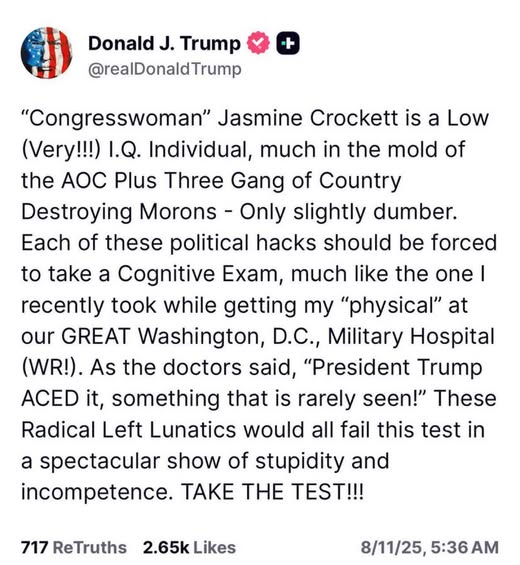Discover the latest on Trump’s call for cognitive tests for lawmakers Jasmine Crockett and AOC. Explore the implications and reactions surrounding this controversial proposal.
Introduction: A New Front in Political Discourse
In a recent development that has ignited political debate and drawn sharp criticism, President Donald Trump has publicly called for Representatives Jasmine Crockett (D-TX) and Alexandria Ocasio-Cortez (D-NY), often referred to as AOC, to undergo cognitive tests. This demand, made through his social media platform, has been characterized by supporters as a necessary measure to ensure the mental fitness of those in positions of power, while detractors have labeled it as a politically motivated attack and a dangerous precedent. This blog post will delve into the specifics of Trump’s statements, the reactions from Crockett and Ocasio-Cortez, the broader implications of such calls, and the ongoing discussion surrounding cognitive testing for political leaders.
Trump’s Statements and Their Context
Trump’s demand for cognitive tests came in the wake of several public appearances and statements made by Representatives Crockett and Ocasio-Cortez that seemingly drew his ire. While he did not explicitly cite specific instances of concern regarding their cognitive abilities, his posts on social media alluded to what he perceived as flawed reasoning and inappropriate rhetoric.
It is crucial to note that this is not the first time Trump has raised questions about the cognitive fitness of his political opponents. During his presidency and in subsequent statements, he frequently suggested that individuals like President Joe Biden were not mentally sharp enough to hold office, often citing gaffes or perceived inconsistencies in their speech. His call for cognitive tests for Crockett and Ocasio-Cortez can be seen as an extension of this tactic, broadening the scope to include other prominent figures in the Democratic party who have been vocal critics of his policies and actions.
Reactions from Crockett and Ocasio-Cortez

Both Representatives Crockett and Ocasio-Cortez responded swiftly and strongly to Trump’s demands.
Jasmine Crockett took to social media and cable news to vehemently reject the suggestion that she is cognitively impaired. She framed Trump’s call as a baseless personal attack designed to distract from substantive policy issues and to denigrate his political opponents. Crockett highlighted her educational background as a practicing attorney and her track record in Congress, questioning the legitimacy and motivation behind Trump’s sudden interest in cognitive testing for specific individuals. She suggested that such demands were rooted in political animosity rather than genuine concern for the well-being of the nation.
Alexandria Ocasio-Cortez echoed these sentiments, describing Trump’s remarks as “pathetic” and indicative of his own insecurities. She pointed to his history of making similar unsubstantiated claims against critics and argued that the focus should remain on policy debates and the needs of the American people, rather than resorting to personal attacks and questioning the mental capacity of political adversaries. Ocasio-Cortez also raised concerns about the potential for such calls to be weaponized for partisan gain, setting a dangerous precedent for future political discourse.
The Broader Implications of Calling for Cognitive Tests
Trump’s demand raises several important questions about the role of cognitive testing in politics and the potential ramifications of normalizing such calls.
Weaponization of Mental Fitness: Critics argue that suggesting cognitive tests for political opponents can easily become a tool for political mudslinging and distraction. It risks shifting the focus away from policy debates and towards personal attacks on an individual’s mental capacity, potentially undermining respectful and substantive dialogue.
Setting a Dangerous Precedent: If calls for cognitive testing become commonplace, it could create a climate where politicians are constantly pressured to prove their mental fitness based on subjective interpretations of their statements or actions. This could disproportionately affect certain groups and potentially discourage qualified individuals from entering public service.
Defining Cognitive Fitness: There is no universally agreed-upon standard for the cognitive fitness required to serve in political office. Cognitive tests are typically designed for medical diagnosis and may not be directly applicable to evaluating the complex decision-making processes involved in governance. Furthermore, who would administer and interpret these tests in a politically neutral manner remains a significant challenge.
Public Trust and Transparency: On the other hand, some argue that ensuring the mental acuity of elected officials is a legitimate concern, given the significant responsibilities they hold. Proponents of cognitive testing, or at least greater transparency regarding the health of political leaders, believe that the public has a right to be confident in their representatives’ ability to make sound judgments.
The Ongoing Discussion and Future Outlook
The controversy sparked by Trump’s call for cognitive tests for Representatives Crockett and Ocasio-Cortez is likely to continue fueling debate. It highlights the increasing polarization of American politics and the tendency for personal attacks to overshadow substantive policy discussions.
Moving forward, it is essential to consider the ethical and practical implications of introducing cognitive testing into the political arena. While the desire for competent and capable leadership is understandable, the potential for misuse and the lack of clear standards raise significant concerns. The focus should arguably remain on evaluating politicians based on their policy positions, their track record, and their ability to effectively represent their constituents, rather than resorting to potentially biased and politically motivated demands for cognitive assessments.
This incident also underscores the need for a more civil and respectful political discourse, where disagreements are addressed through reasoned debate rather than personal attacks and unsubstantiated claims about an opponent’s mental state.
